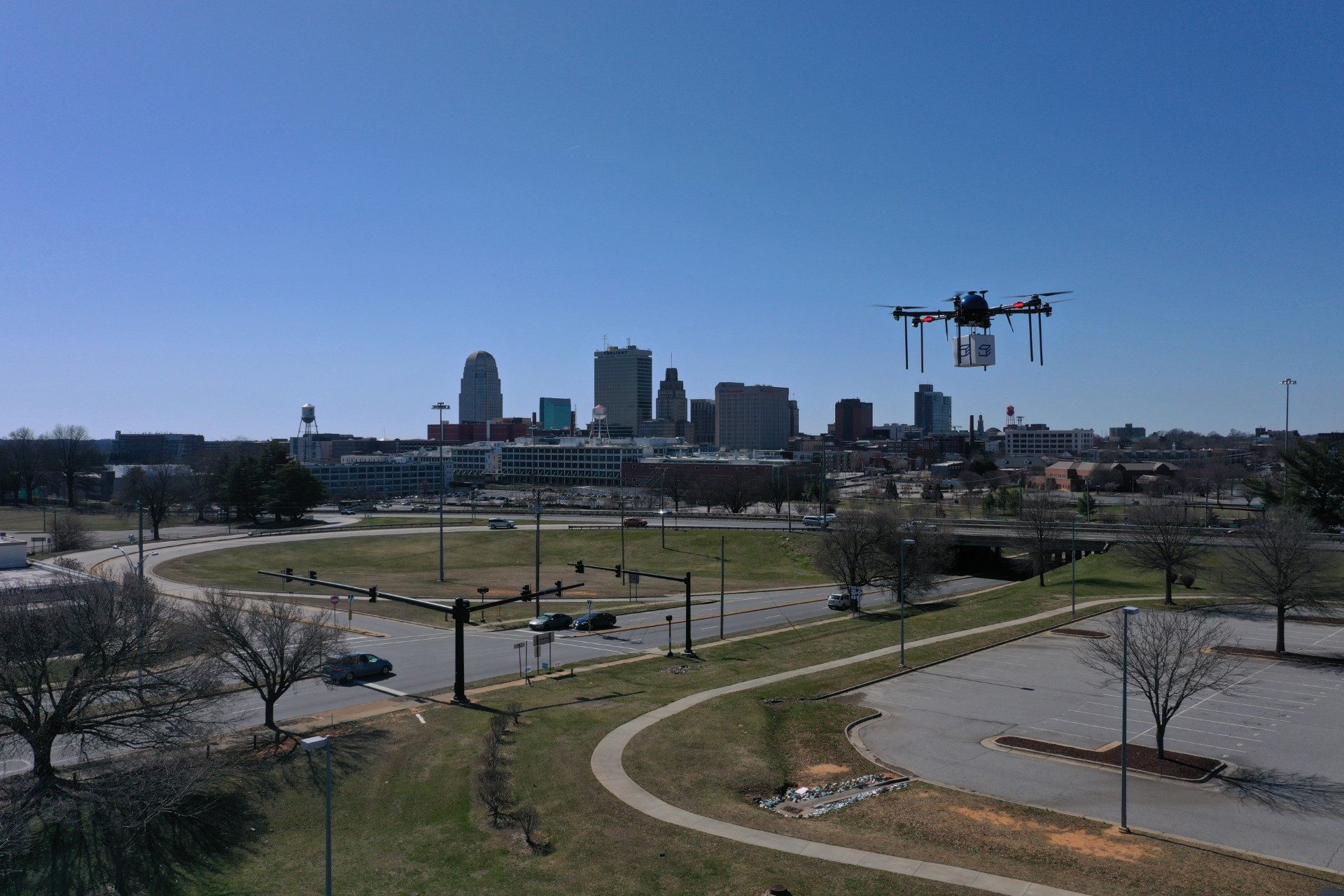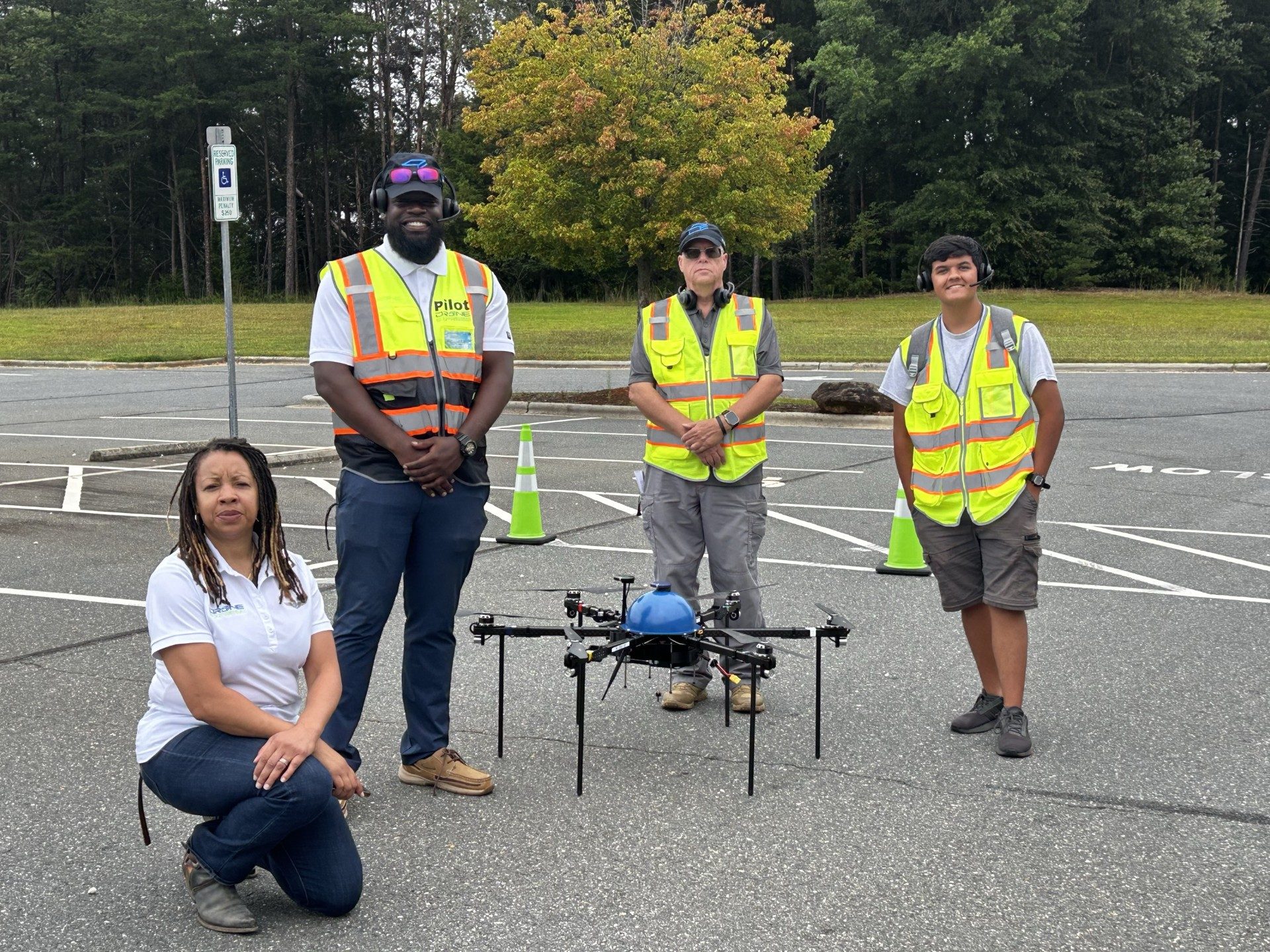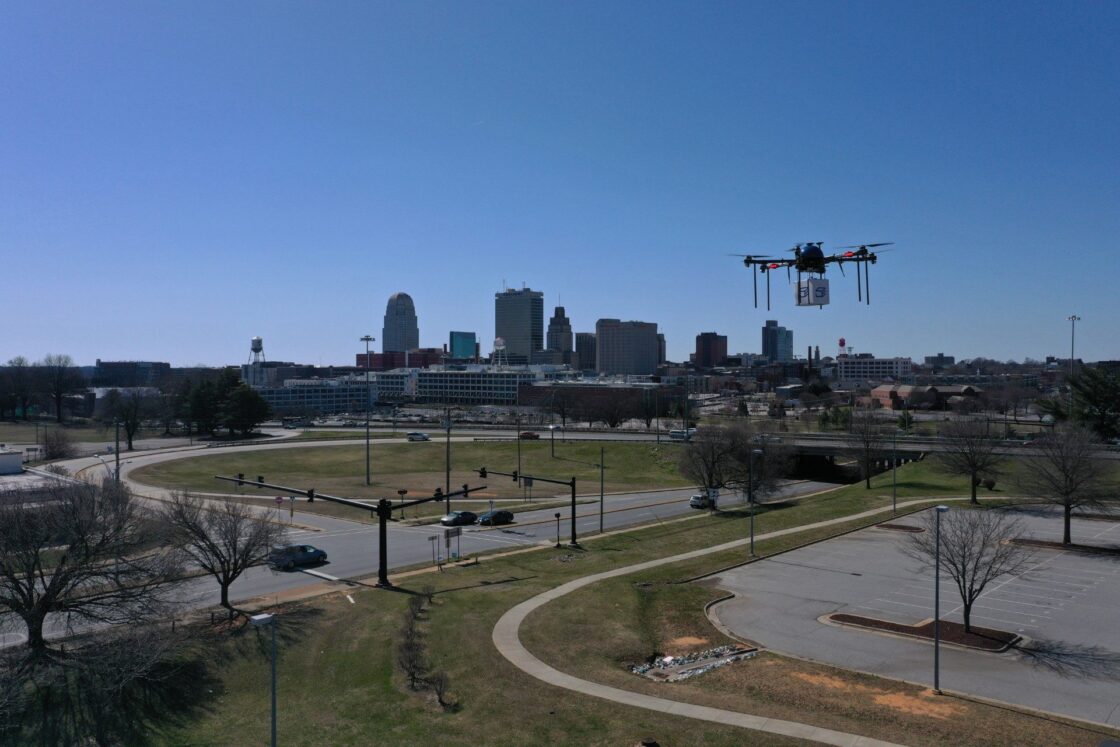Drone Express Aims to Revolutionize Delivery with Marketplace Model and Rapid Service Expansion
By DRONELIFE Features Editor Jim Magill
Drone Express, based in Dayton, Ohio, is pursuing a business model that company officials hope will someday make it the Amazon of the drone delivery industry.
The company, which recently launched delivery service operations in Winston-Salem, N.C., plans to offer its customers the benefits of drone delivery service, while offering access to groceries and other products from multiple vendors, similar to the way that Amazon conducts its ground delivery business, CEO Beth Flippo told DroneLife.
“We’re not selling our own products, the retailers will be placing their goods on our marketplace and people will be able to order right from there,” she said. “What’s unique about us owning the marketplace side is that we’re able to provide the same model that Amazon does.”


To accomplish its deliveries, Drone Express will employ company-designed hexacopters, capable of flying at 40 mph, with battery life capable of sustaining about 40 minutes of flight time. The drones, which will carry their cargo suspended from the crafts’ underside, will have a carrying capacity of up to 10 pounds, although Flippo said the typical payload will likely be five pounds or less, so as to not unduly stress the aircraft, while also pursuing the Amazon delivery model.
“Most of Amazon’s deliveries are under five pounds,” she said. “We’re trying to do that same thing, where it’s more frequency and smaller items.” Flippo added that the company’s drones can deliver 50 pounds worth of items to a home, employing 10 drone flights carrying five pounds apiece, at a lower cost than having the same items delivered by a single truck.
“So, we actually view our weight limit as our strength. We can break up the order and still do it more economically than having a truck drive around with it for two hours,” she said.
While the company’s goal is to offer drone deliveries within a five-mile radius of the UAV’s home base, initial deliveries will be confined to customers within a two- to three-mile radius.
Incorporated in 2021, Drone Express, was established as a spinoff of Telegrid, which was started by Flippo’s parents in 1984 as a defense contractor that built radios and wireless mesh networks for the military. “One of those mesh networks was really good for unmanned aircraft. All these drone delivery companies were calling us to try to buy these radios. We said, maybe this is a commercial opportunity,” Flippo said. “So, we spun off Drone Express, and built the aircraft around this mesh network.”
Having had the experience of dealing with the FAA through Telegrid helped give Drone Express the background it needed to pursue the agency’s approval to conduct commercial beyond visual line of sight operations, she said. Drone Express was one of the first 10 companies to be accepted into the FAA’s type-certification program, a critical step toward obtaining a Part 135 certificate allowing the company to conduct commercial drone delivery operations.
“It’s the same certificate that American Airlines gets,” she said. To date, only five other UAV delivery companies have received that certification: Amazon, Google Wing, Zipline, UPS Flight Forward and Quasi Aviation, which works in partnership with drone delivery company Flytrex.


Drone Express initially partnered with Kroger to provide deliveries of the chain’s grocery products. That was followed by partnerships with Papa John’s and Wind Supply, the largest construction materials distributor in the United States. However, Flippo said that Drone Express quickly decided to evolve its strategy to move beyond partnering with just a small group of retailers.
She noted that when a drone delivery partners with a retailer such as Kroger that retailer “owns” the customer.
“They own all the data that comes from those deliveries, and we were purely a logistics company,” she said. “We realized that we really wanted to have that interaction with the customer.”
Two years ago, the company started developing its own app that would help Drone Express create a new marketplace in which a customer could order virtually anything he or she wanted and have it delivered to their home in less than 15 minutes.
“It is very similar to Instacart, so we’re not selling our own products,” she said. Instead a large number of retailers would place their goods for sale on the Drone Express market and customers would be able to choose from a variety of different products. Instead of paying a delivery fee for each drone flight, customers will pay a monthly fee to Drone Express.
“What’s unique about us owning the marketplace side is that we’re able to provide the same model that Amazon does,” Flippo said. “For $5.99 a month, you get unlimited deliveries, no minimum order quantity, and no tipping.”
In choosing the Winston-Salem area as a market to test its business model, Drone Express partnered with AeroX, a public-private collaboration dedicated to creating an advanced air mobility ecosystem in North Carolina. AeroX is installing a network of ground-based radar stations capable of tracking any airborne object — including drones, manned aircraft and even birds – flying at altitudes between the surface and 400 feet.
AeroX’s network gives Drone Express the capability of employing a ground-based detect-and-avoid system without having to install additional equipment on its drones. “The other option is doing detect-and-avoid on board the aircraft, but the problem is drones can’t carry that much right now, so the cameras are limited in how big they can be, and by the time you identify an object, it’s right on top of you,” she said.
In addition, Flippo said the Winston-Salem area fits in well with the company’s business strategy of focusing on diverse urban areas as well as those that are characterized as “food deserts,” in which people don’t have ready access to grocery stores.
“We know how critical delivery is to the people that live within those areas who need access to pharmacy and grocery products and all these things that might not be where the people are. And they might not even be able to go drive to them,” she said.
Read more:

 Jim Magill is a Houston-based writer with almost a quarter-century of experience covering technical and economic developments in the oil and gas industry. After retiring in December 2019 as a senior editor with S&P Global Platts, Jim began writing about emerging technologies, such as artificial intelligence, robots and drones, and the ways in which they’re contributing to our society. In addition to DroneLife, Jim is a contributor to Forbes.com and his work has appeared in the Houston Chronicle, U.S. News & World Report, and Unmanned Systems, a publication of the Association for Unmanned Vehicle Systems International.
Jim Magill is a Houston-based writer with almost a quarter-century of experience covering technical and economic developments in the oil and gas industry. After retiring in December 2019 as a senior editor with S&P Global Platts, Jim began writing about emerging technologies, such as artificial intelligence, robots and drones, and the ways in which they’re contributing to our society. In addition to DroneLife, Jim is a contributor to Forbes.com and his work has appeared in the Houston Chronicle, U.S. News & World Report, and Unmanned Systems, a publication of the Association for Unmanned Vehicle Systems International.
Miriam McNabb is the Editor-in-Chief of DRONELIFE and CEO of JobForDrones, a professional drone services marketplace, and a fascinated observer of the emerging drone industry and the regulatory environment for drones. Miriam has penned over 3,000 articles focused on the commercial drone space and is an international speaker and recognized figure in the industry. Miriam has a degree from the University of Chicago and over 20 years of experience in high tech sales and marketing for new technologies.
For drone industry consulting or writing, Email Miriam.
TWITTER:@spaldingbarker
Subscribe to DroneLife here.


